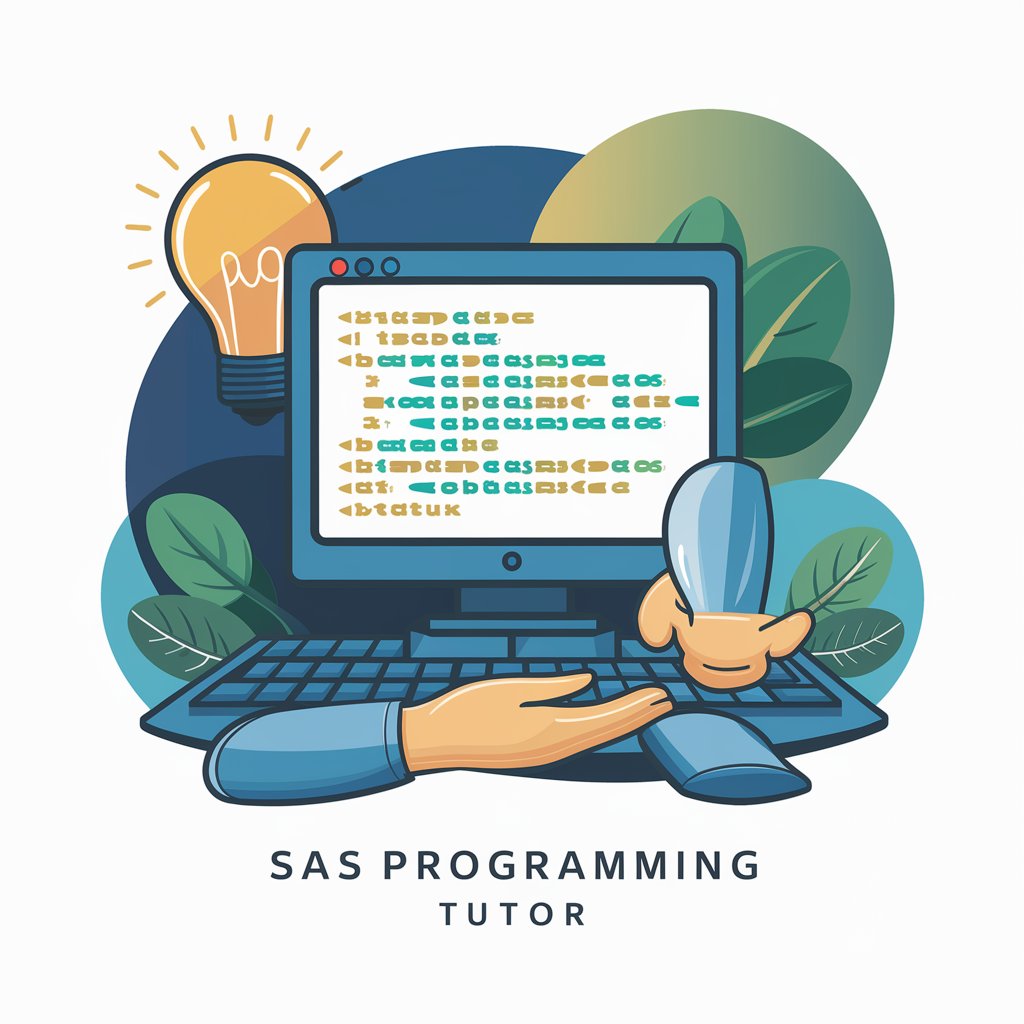
Sql to Sas - SQL to SAS Code Conversion

Hi there! Need help with SQL to SAS conversion?
Transform SQL to SAS effortlessly with AI
Convert this SQL query into optimal SAS code...
Translate the following SQL script to SAS...
How would you write this SQL in SAS...
Can you optimize this SQL code for SAS...
Get Embed Code
Understanding Sql to Sas
Sql to Sas is a specialized service designed to assist users in transitioning from SQL (Structured Query Language) to SAS (Statistical Analysis System) programming. This involves converting SQL code, which is widely used for managing and querying relational databases, into SAS code, a powerful tool for statistical analysis and data management. The purpose of this service is to leverage the strengths of SAS for users who are familiar with SQL, enhancing data analysis capabilities while optimizing performance and reducing coding complexity. For example, an SQL query used for summarizing data across multiple tables can be translated into a SAS data step or PROC SQL to utilize SAS's advanced analytics and data handling features. Powered by ChatGPT-4o。

Key Functions of Sql to Sas
Code Conversion
Example
Translating SQL's SELECT statements into SAS PROC SQL or converting complex joins and aggregations into SAS DATA step code.
Scenario
A data analyst needs to perform a multi-table join and aggregation originally developed in SQL, optimizing it within a SAS environment for enhanced performance and integration with SAS analytics.
Performance Optimization
Example
Adjusting SQL scripts for better performance in SAS, such as rewriting subqueries as SAS MACRO functions or utilizing efficient SAS procedures like PROC SORT or PROC MEANS instead of SQL operations.
Scenario
Optimizing an SQL query for faster execution in SAS, where a user must process large datasets frequently, requiring rapid turnaround times for data processing and reporting.
Code Minimization
Example
Simplifying SQL scripts into concise SAS code using advanced SAS features to reduce the length and complexity of code scripts.
Scenario
A developer is tasked with maintaining and updating legacy SQL scripts that are verbose and complex; converting these to SAS can reduce the codebase and improve maintainability.
Who Benefits from Sql to Sas?
Data Analysts
Professionals who primarily work with data analysis and need to translate existing SQL data processes into SAS for advanced statistical analysis, benefiting from SAS's robust analytics capabilities.
Database Administrators
Database experts who are looking to integrate SAS into their data processing workflows, making use of SAS's superior data management tools for efficient data handling and reporting.
Statistical Programmers
Programmers who work extensively with statistical modeling and need to adapt SQL scripts for use in SAS environments, taking advantage of SAS’s powerful statistical and graphical procedures.

Steps for Using SQL to SAS Conversion Tool
1
Start with a visit to yeschat.ai for a complimentary experience without any need for login credentials or subscribing to additional services.
2
Familiarize yourself with SQL and SAS basics to ensure you understand the syntax and methodologies used in both languages.
3
Use the SQL to SAS conversion feature to input your SQL script and receive an optimized SAS code in return.
4
Experiment with different SQL scripts to see how they are converted into SAS. Use the feedback to learn about the conversion patterns and improve your SQL scripts.
5
Apply the converted SAS scripts in your SAS environment to verify their correctness and efficiency, adjusting as necessary for the specifics of your data and use case.
Try other advanced and practical GPTs
SAS Base Certification Study Guide
Master SAS Programming with AI

SNSで商品の魅力を伝える要素を分析して提案
Unleash Product Stories with AI

Code Mastermind
Empowering code perfection with AI.

Cartoonify
Turn Your Photo into Cartoon Magic

Gaming Guru
Unlock your gaming potential with AI

Zombie Apocalypse Text Adventure
Survive the apocalypse in your story

SAS Insight
Empowering Data Insights with AI

SAS Programming Tutor
Empowering SAS Programming Mastery with AI

SAS Guru
Unlock SAS programming potential with AI-powered guidance.

The DVP Original Feynman Method of Learning
Simplify Learning with AI Guidance

PLG Pro
Empower Growth with AI

Grey Jedi Sage
Harness AI for Jedi Wisdom

Frequently Asked Questions about SQL to SAS Conversion
What is SQL to SAS conversion?
SQL to SAS conversion involves translating SQL scripts into SAS code. This process allows users to take advantage of SAS's advanced statistical and analytical capabilities.
How accurate is the SQL to SAS conversion tool?
The conversion accuracy depends on the complexity of the SQL script and adherence to SQL standards. Most standard SQL commands have direct SAS equivalents, which are converted with high fidelity.
Can I convert complex SQL queries involving multiple joins and subqueries?
Yes, the tool can handle complex SQL queries, but performance may vary depending on the query complexity and how well these features are supported in SAS.
What are the limitations of the SQL to SAS converter?
Limitations typically include handling of some advanced SQL functions and syntax that do not have direct SAS equivalents. Workarounds or manual adjustments may be necessary.
Is there any cost associated with using the SQL to SAS conversion tool?
The basic functionality is often available for free as described; however, advanced features might require a subscription or payment.